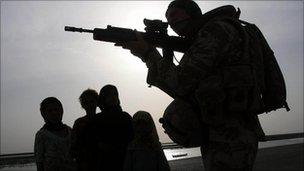UK beefs up cyber warfare plans
- Published

Cyber soldiers will work alongside other troops to protect vital computer systems
'Cyber' soldiers will be put alongside conventional troops as the government puts cyber attacks on an equal footing with other conflicts.
The news comes as US defence firm Lockheed Martin admitted it came under a significant cyber attack last week.
The Ministry of Defence (MoD) said it will recruit hundreds of cyber experts to shore up UK defences.
It is part of a £650m fund set aside by the government for dealing with cyber security.
"Our forces depend on computer networks, both in the UK and in operations around the world. But our adversaries present an advance and rapidly developing threat to these networks," said the MoD in a statement.
"Future conflict will see cyber operations conducted in parallel with more conventional actions the sea, land and air operations," it added.
It will see a growing band of cyber experts deployed by the armed forces to protect vital networks.
"We expect to significantly grow the number of dedicated cyber experts in the MoD and the number will be in the hundreds but precise details are classified," said an MoD spokesman.
"As with all personnel they will be expected to serve wherever necessary to do their jobs and this could be in the UK or in operational theatre," he added.
Cyber spies
Government networks receive around 20,000 malicious e-mails each month, around 1,000 of which are deliberately targeting them.
There has also been a flurry of attacks aimed atother sensitive targets in recent months.
Defence firm Lockheed Martin, which makes weapon systems that are sold around the world, was the latest to be hit.
During a cyber attack last week, the firm said it took counter measures "almost immediately" and stressed that none of its programmes had been compromised.
The Pentagon is now investigating the incident.
The UK's National Cyber Security Programme was announced as part of the Strategic Defence and Security Review in October 2010.
It will see a number of government departments working with industry and universities in order to achieve the following:
Reduce vulnerability to cyber espionage
Improve ability to detect and defend against cyber attack
Incorporate cyber into mainstream Defence concepts and doctrine
Ensure the UK's critical infrastructure, vital government networks and service are resilient from attack.
The US is also taking a tougher line on cyber attacks and plans to issue detailed plans next month.
This week the Pentagon said that computer sabotage coming from another country can constitute an act of war, to which it may respond using traditional military force.
Security firm MacAfee recently found that eight out of 10 countries around the world had had critical networks targeted by hackers during 2010.
The Stuxnet worm has become the most high-profile piece of malware with the potential to harm key infrastructure.
Analysis of the malicious computer code suggests it was designed to take control of machinery in Iran's nuclear facilities.
Some have pointed the finger at the Israeli secret service as the source of the malware. Both Israel and the US have been highly critical of Iran's nuclear programme.
- Published30 May 2011
- Published19 April 2011
- Published12 May 2011
- Published29 March 2011